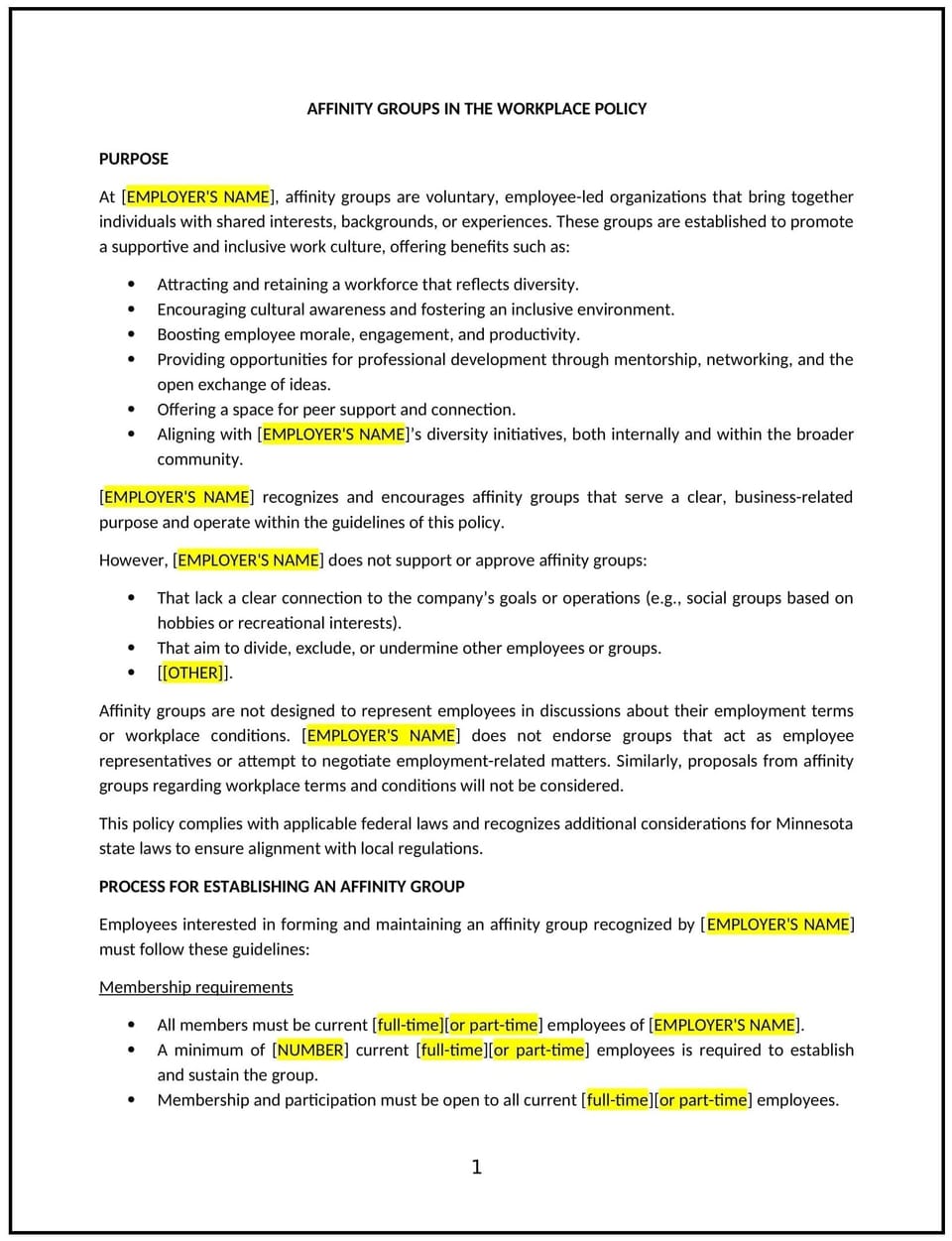Anti-corruption and foreign corrupt practices policy (Minnesota): Free template

Anti-corruption and foreign corrupt practices policy (Minnesota)
This anti-corruption and foreign corrupt practices policy is designed to help Minnesota businesses establish clear guidelines to prevent corrupt practices in their operations. Whether businesses are engaging in international trade, working with foreign partners, or conducting local transactions, this policy provides a framework to promote ethical behavior and transparency. Tailored to Minnesota’s business environment, this policy emphasizes adherence to federal laws like the Foreign Corrupt Practices Act (FCPA) while addressing local ethical standards.
By implementing this policy, businesses in Minnesota can foster a culture of integrity, reduce risks associated with corruption, and build trust with partners, customers, and stakeholders.
How to use this anti-corruption and foreign corrupt practices policy (Minnesota)
- Define anti-corruption principles: Clearly outline the business’s commitment to ethical practices, transparency, and zero tolerance for bribery or corrupt activities.
- Establish clear guidelines: Provide specific rules for employees and partners regarding gifts, hospitality, donations, and interactions with government officials or foreign entities.
- Train employees: Educate employees on anti-corruption laws, including the FCPA, and the importance of ethical business practices.
- Monitor transactions: Implement systems to review and track financial transactions, especially those involving international partners or government entities.
- Conduct due diligence: Assess the integrity of third-party partners, vendors, and agents to ensure they align with the business’s anti-corruption standards.
- Create reporting mechanisms: Provide employees with a safe and confidential way to report suspected corrupt activities or ethical violations.
- Regularly review the policy: Update the policy as needed to reflect changes in laws, business operations, or industry standards.
- Communicate the policy: Share the policy with employees, partners, and stakeholders to ensure awareness and understanding.
Benefits of using this anti-corruption and foreign corrupt practices policy (Minnesota)
This policy offers several advantages for Minnesota businesses:
- Promotes ethical behavior: A clear anti-corruption policy reinforces the business’s commitment to integrity and ethical practices.
- Reduces legal and financial risks: By adhering to anti-corruption laws, businesses can avoid penalties, fines, and reputational damage.
- Builds trust with stakeholders: Demonstrating a commitment to transparency and ethical practices enhances relationships with customers, partners, and investors.
- Supports international operations: For businesses engaged in global trade, this policy helps navigate complex legal requirements and cultural differences.
- Encourages accountability: Clear guidelines and reporting mechanisms empower employees to act ethically and report misconduct.
- Enhances reputation: A strong anti-corruption stance improves the business’s reputation in the community and industry.
- Aligns with legal standards: The policy helps businesses align with federal laws like the FCPA and Minnesota’s ethical business practices.
Tips for using this anti-corruption and foreign corrupt practices policy (Minnesota)
- Communicate the policy effectively: Share the policy with employees during onboarding and through regular training sessions.
- Provide anti-corruption training: Educate employees on the FCPA, anti-bribery laws, and the business’s ethical standards.
- Monitor third-party relationships: Regularly assess the integrity of vendors, partners, and agents to ensure they align with the policy.
- Encourage reporting: Create a safe and confidential channel for employees to report suspected corrupt activities or ethical violations.
- Review the policy periodically: Update the policy as needed to reflect changes in laws, business operations, or industry standards.
- Be transparent: Share the policy with stakeholders to demonstrate the business’s commitment to ethical practices.
Q: Why should Minnesota businesses adopt an anti-corruption policy?
A: Businesses should adopt this policy to promote ethical behavior, reduce legal and financial risks, and build trust with stakeholders.
Q: What are the key components of an anti-corruption policy?
A: A policy should include clear guidelines on gifts, hospitality, donations, and interactions with government officials, as well as training, monitoring, and reporting mechanisms.
Q: How can businesses ensure employees understand the policy?
A: Businesses should provide regular training on anti-corruption laws and the policy’s guidelines, emphasizing the importance of ethical behavior.
Q: What should businesses do if they suspect corrupt activities?
A: Businesses should investigate the matter promptly, using their reporting mechanisms, and take appropriate action to address the issue.
Q: How can businesses monitor third-party relationships?
A: Businesses should conduct due diligence on vendors, partners, and agents, and regularly review their activities to ensure alignment with the policy.
Q: What training should businesses provide to employees?
A: Businesses should educate employees on anti-corruption laws, ethical standards, and the business’s specific guidelines for preventing corrupt practices.
Q: How often should the policy be reviewed?
A: The policy should be reviewed annually or as needed to reflect changes in laws, business operations, or industry standards.
This article contains general legal information and does not contain legal advice. Cobrief is not a law firm or a substitute for an attorney or law firm. The law is complex and changes often. For legal advice, please ask a lawyer.


